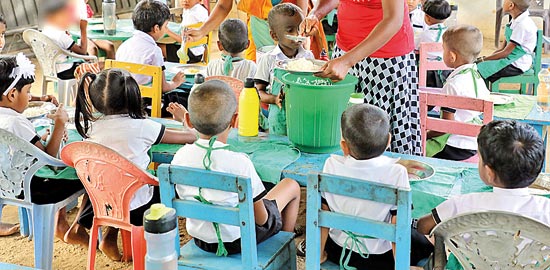News
Schoolchildren: A lack of food, a lack of performance

The issue of food security is having a severe impact on young school children. Pic by M A Pushpa Kumara
The issue of food security in the country is leaving a mark on students’ nutrition, affecting their health and well-being, and leading to learning loss, say education and nutrition experts.
Principals’ Union of Sri Lanka Secretary Mohan Parakrama Weerasinghe said: “Child malnutrition is currently at 50%. Food that school children bring are low in nutrients. Their school attendance and participation in extracurricular activities has decreased.”
“While the school meals are still provided by the Government, the food is not high in nutritional quality,” he added.
They have also observed that leftover parcels from the mid-day meal programme are furtively taken home by some children, demonstrating their poverty-stricken backdrops, Mr Weerasinghe pointed out.
Loss of learning opportunities in the wake of an economic downturn gives rise to school dropouts amid a lack of access to resources.
Education authorities and related development organisations should increase their support to school meal systems to address the nutritional needs of all school age children due to the increased risk of children dropping out of school, as means of survival among socio-economically underprivileged households, say education and nutrition experts.
District Secretary, Ampara District Chinthaka Abeywickrama pointed to deviations in children’s behavioural patterns such as an increase in their negative emotions including stress, anxiety, and depression as a result of frustrations in volatile domestic spheres. Their inability to socialise and their inactivity due to low food intake is quite apparent, he says. There are also more obvious physical effects such as nausea, migraine etc.
“The school meal programme is currently ongoing for primary children by non-governmental organisations with less than 100 students in the Ampara District. Rs 100 is spent on each student. There are five menus for the five days which are prepared by parents,” Mr Abeywickrama said.
“The mid-day meal programme for disadvantaged schools will be strengthened. Moreover, the Ministry has set up provincial-level committees to monitor dropouts and find effective solutions,” the Education Ministry (MoE) confirmed.
According to an MoE-led national assessment, 85% of children in Grade 3 are not attaining minimum competence in literacy and numeracy, which is pivotal in their shift to secondary school.
Younger children in primary grades overall, and in plantation estates especially, are faced with an education crisis.
At present, Sri Lanka apportions less than 2% of its Gross Domestic Product (GDP) on education, which is lower than the international benchmark of 4-5% of GDP and the lowest in the South Asia region.
The best way to say that you found the home of your dreams is by finding it on Hitad.lk. We have listings for apartments for sale or rent in Sri Lanka, no matter what locale you're looking for! Whether you live in Colombo, Galle, Kandy, Matara, Jaffna and more - we've got them all!

